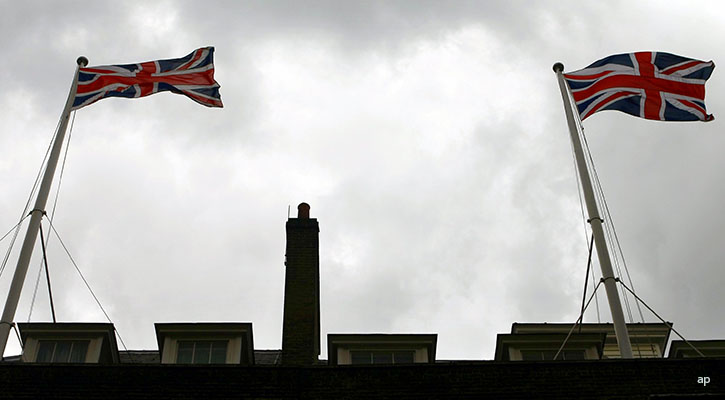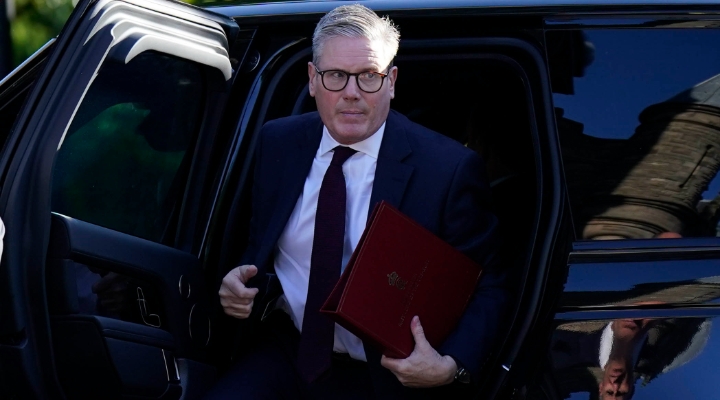.jpg)
You Can’t Hold on Forever
There’s no other way of putting it: it’s been an astounding week in politics. We’ve seen not just an exodus of ministers, but a near-implosion of the basic functions of government, and then some fairly wild (and confusingly-timed) political manoeuvring. One minister was in post for around 36 hours before quitting. Another urged the prime minister to quit the day after being appointed chancellor. Another said she would run for leader live on television, while, bizarrely, one MP was teased for “unresigning” after the fact. At the heart of it all, an eccentric former mayor who just wouldn’t be told. The end is now supposedly upon him. But is it? One suspects that at some point the words "kicking and screaming" may adorn a national newspaper or two. Watch this space.
There’s Always a Local Angle
In recent years a trend has emerged where local newspapers and online publications give their spin on major news events by headlining stories with the most relevant angle to them. US cable news channel NY1 covered Boris’s resignation speech with the screen ticker “New Yorker Stepping Down as UK PM”, referencing the delivery of baby Boris on the Upper East Side of New York way back in 1964. Meanwhile, Cherwell, one of two main newspapers run by students at Oxford University, ran with “Balliol Student Ejected From Accommodation”. There is always a local news angle.
The 1970s Comparison is Wrong
Rising inflation and trade union action have prompted frequent comparisons with Britain’s experience of the 1970s of late, but that comparison is wrong – at least, that is according to one economist at the Confederation of British Industry (CBI), who gave an interesting talk at Morningstar Investment Conference UK (MICUK) this Tuesday. The CBI’s deputy chief economist Anna Leach said the UK’s current economic malaise looks more akin to the situation faced by Margaret Thatcher in the early 1980s, when high interest rates and an appreciation in sterling tanked the economy. For more on Leach’s predictions, check out Sunniva Kolostyak’s write-up of the event here.
Brotherly Love Tells You a Lot
As a demonstration of how quickly politics can change the world around you, nobody took Leo Johnson seriously on Tuesday morning when he told MICUK delegates that bad leaders weren’t worth worrying about because they would be sacked. At the time, onlookers had already endured months of Johnson wriggling free from repeated political crises, so you could have forgiven them for asking why it was that PwC’s head of disruption and innovation’s brother appeared to be the ever-irritating exception to the rule. By the end of the week, the younger Johnson’s remarks looked perfectly-timed, nay prophetic, even if they were the only concrete reference made to an otherwise very large elephant in the room.
The NHS Has a New Pilot Scheme
Away from frontline politics, you may have noticed a new "pilot” scheme being rolled out within the NHS. According to a BBC report this week, chemotherapy drugs will now be flown between Portsmouth and a hospital (we assume the only hospital) on the Isle of Wight. But it won’t be a plane doing the heavy lifting, it will be a drone. NHS England’s chief executive Amanda Pritchard has called the scheme “extraordinary”, and has hailed a second trial that should take place in Northumbria. Health secretary Sajid Javid said people should be able to get treatment “no matter where they are”, though, of course, he is no longer health secretary.
Captain Kirk is Boldly Going
Remember Stuart Kirk? This week the now-former global head of responsible investing at HSBC Asset Management announced his resignation from the company in a broadside at the business on LinkedIn. Eagle-eyed readers may remember Kirk as the finance expert who kicked up a huge controversy at a Financial Times event in May when he delivered a presentation entitled “Why Investors Need Not Worry About Climate Risk”. HSBC’s chief executive quickly intervened in the matter, and there was a huge ensuing row. Having now left the company, Kirk was not only quick to denounce the actions of his former employer, but to announce he would be launching a new ESG initiative of his own. “I’ve been gathering a crack group of like-minded individuals together to deliver what is arguably the greatest sustainable investment idea ever conceived”, he said on the social media platform. Whether you agree with his assertions about being “cancelled” or not, that is a pretty big statement.
Mars and Tesco are in a Cat Fight
There were plenty of more trivial business stories it was easy to miss amid the hubbub this week. Among them was an apparent row between Mars and Tesco over the chocolate giant’s pricing of Whiskas cat food. There are few details available about the bust-up, but Tesco has said it would not pass on “unjustifiable price prices” from its suppliers to its customers. The ruckus now means fresh supplies of the popular moggy meals will not be forthcoming from Mars, though Tesco has said it hopes the issue will be “resolved soon”. Meow.
Trends Like This Don’t Suit UK Cinemas
No doubt aided by the explosive power of social media, UK cinemas found themselves at the centre of a difficult situation this week, as the Minions spin-off movie Minions: Rise of Gru hit screens. But all was not well. A social media trend involving thousands of teenage lads dressing up in suits quickly started disrupting the screenings and upsetting families, and certain cinemas felt they had no choice but to ban attendees in smart attire. It will all die down soon enough, but, though it was far from gentle, the #gentleminions trend has divided opinion in interesting ways. Universal, which produced the flick, actually endorsed the behaviour in a tweet, though it probably didn’t have to deal with crying children and angry parents.
The CMA is Probing Petrol Prices
Readers will normally hear about the Competition and Markets Authority (CMA) in the context of big corporate takeovers, but the regulatory body is now looking at petrol pricing amid what are – for drivers – unsustainable increases in the cost of filling up at the pumps. It’s all at the behest of business secretary Kwasi Kwarteng, who stepped in to order an urgent review after the now-former-chancellor Rishi Sunak’s 5p fuel duty cut in March. It appears Kwarteng is still in post, but that could change at any time.
Sri Lanka is in Crisis
And speaking of petrol, Sri Lanka energy minister Kanchana Wijesekera this week warned the country was rapidly running out of petrol. The country had already suspended petrol and diesel sales for non-essential vehicular activity, but the measure was apparently not enough to shore up reserves. Wijesekera has since said Sri Lanka has but 12,774 tonnes of diesel and 4,061 tonnes of petrol left, as the country faces its biggest economic crisis since it gained independence from the United Kingdom back in 1948.




























